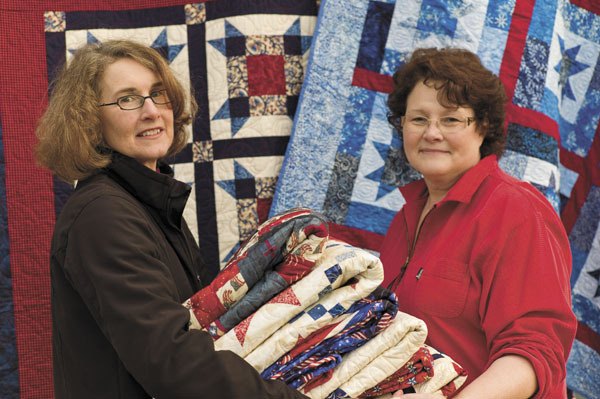Stacks of red, white and blue quilts filled the loading dock at The Country Store & Gardens last Wednesday, their first stop en route to Afghanistan, where they will warm wounded troops being evacuated from the hospital at Bagram Airfield.
The shipment of those 150 quilts — handmade as part of Vashon’s American Hero Quilts project — was a long time in coming.
“It’s so exciting to see this happening,” said Sue Nebeker, who heads the project. “It’s wonderful.”
Nebeker first began American Hero Quilts in 2004 as a way to say thank you to the service men and women from this region who had been wounded in Iraq and Afghanistan. To date, Nebeker and her considerable cast of volunteers have created more than 7,600 quilts, most of them delivered to Madigan Army Medical Center in nearby Fort Lewis.
But a little more than a year ago Nebeker received an e-mail from the Craig Joint Theater Hospital in Afghanistan, asking for quilts for the wounded personnel at the hospital. It was cold there, the lieutenant told her, and there were not enough blankets and coats for the injured. Would she be willing, he asked, to send some of the quilts to him there?
Nebeker, who did not relish the idea of wounded men and women suffering through the cold with an inadequate supply of standard-issue military blankets, said yes. She hoped to send 100 quilts a month, all handmade in the colors of the U.S. flag.
The logistics, however, proved formidable. The military cannot carry anything other than military cargo, and quilts, even for wounded soldiers, are not allowed. Some well-placed individuals snuck some quilts onto a few military planes, but that was not a sustainable solution. And paying to ship them through regular routes would have cost $900 a month, a prohibitive amount, according to Nebeker.
Still, Nebeker held fast to her desire to cover those injured men and women, and requests from military nurses in Afghanistan kept coming in.
Then, someone stepped up and made a difference.
Karen Roti was celebrating her 64th birthday last August and, as she has done for years, came to her family’s Vashon cabin with her two sisters. The trio turned out for the art tour and found Nebeker and her quilts in Blooms & Things. Roti was captivated by the project and, though not a quilter herself, was determined to help.
So at Nebeker’s request, Roti wrote letters to all the main freight carriers to see if one might help. Seven weeks ago, DHL stepped forward and agreed to ship the quilts to Afghanistan at no charge. It is no small task, though, to ships quilts there, and Nebeker credits Mike Lambert of The Country Store with cutting through considerable red tape these last weeks to accomplish the task.
Now, those quilts are well on the way, destined to be at Bagram Airfield by Christmas.
More quilts are needed, though, and meeting the demand will be a challenge. Nebeker, her part-time employee Su DeWalt and volunteers across the country have been sending out 125 to 150 quilts a month. They hope to up their production considerably and begin sending 450.
That would be enough to cover the 350 wounded service men and women flown out of Afghanistan each month — a number, Nebeker noted, that most Americans do not know — as well as 100 wounded military members from Washington and the surrounding area who are being cared for in the United States.
It will be a tall order, but sending less than that number does not sit will with Nebeker.
Before being transported to the military hospital in Germany, an eight-hour flight from Bagram Airfield, the wounded men and women are lined up on the tarmac on their stretchers, enabling the large transport planes to come and go as quickly as possible, Nebeker said. Afghanistan’s winter cold can be difficult to contend with, and the wounded need protection against it. Once in the plane — which is also cold — it is important that all those being transported have quilts, not just a fraction of them. Imagine, Nebeker said, what those who did not have them would feel, as though somehow their sacrifice was less important than that of others.
The injuries from the war in Afghanistan are often severe, and that long flight out is the first step toward recovery. The quilts go with them every step of their way and are theirs to keep forever.
“It’s like we’re giving them a hug from the start of their journey all the way through,” Nebeker said.
Given what is at stake, Nebeker plans on fulfilling her mission and is asking for help to accomplish it. She plans to take to the Internet and call for volunteers, reaching out on quilting blogs, chat rooms and organizations.
But she knows, too, that many people are tired of the decade-long conflict and would prefer not to think about it.
“People get war fatigue,” she said. “It’s not stopping. It’s just going on and on and on.”
Nebeker concedes she herself has gotten war fatigue at times. But the adversities she faces, she added, are nothing compared to what many of the wounded men and women face, so she will not stop making and sending quilts until there are no more wounded.
“We have to think we can do it,” Nebeker said. “The war hasn’t stopped, and we have to remember that.”
For more information or to find out how to help American Hero Quilts, see www.americanheroquilts.com.



